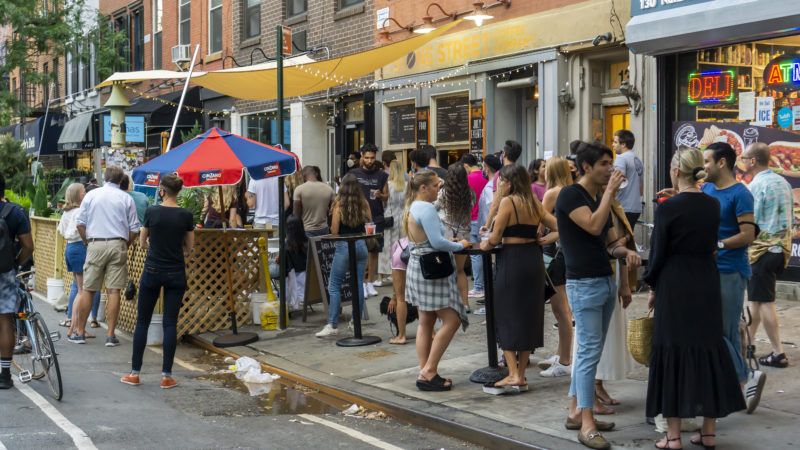New York City's Modest Reopening Marred by Arbitrary Guidelines
Phase 4 of city's reopening means loose rules for zoos but strict requirements for bars.

New York City finally caught up with the rest of the state and entered Phase 4 of its coronavirus reopening Monday.
Virus cases in New York City have remained stable since the state first permitted nonessential businesses in the city, including restaurants, offices, and churches, to open their doors last month. Over the last month, positive test rates in New York City, which had been the epicenter of the state's outbreak, have hovered just over 1 percent.
The city's new phase of reopening will expand the range of outdoor activities permitted. Open-air facilities such as zoos and botanical gardens can now open at 33 percent capacity. TV and movie production will be able to resume, and professional sports can restart, albeit without seated fans. This phase does not include any changes for indoor activities: Concert venues and museums will still be closed, and restaurants and bars are limited to outdoor seating.
Indeed, restrictions on bars are getting tighter.
Gov. Andrew Cuomo decreed that businesses across the state will no longer be allowed to offer walk-up bar service or to serve alcohol to non-dining customers. ("Walk up bar windows is one of the only positive things to come out of the pandemic," one Twitter user commented.) Cuomo also promised to crack down on bars and restaurants that are not strictly obeying reopening guidelines, announcing a "three strikes" rule that would force bars that earn three health violations to close down again.
The governor has blamed the "block party format" of these bar reopenings for the moderate increase in coronavirus cases among young New Yorkers. However, it's possible that the order can be circumvented with merely a serving of potato chips, which seems unlikely to deter large crowds from congregating. And a stricter stance could drive patrons away from sidewalks and curbs into higher risk indoor venues.
The NYC Hospitality Alliance, which represents more than 24,000 eating and drinking establishments in the city, is highly critical of the new ban on serving alcohol without food, saying in a press release that "Cuomo is rolling back the alcohol law that has been in existence since prohibition ended…These constant policy changes raise serious legal questions pertaining to due process, and add more difficulties to the operations of thousands of businesses and their employees who are trying to survive during these uncertain and grueling times."
Obviously, any gathering carries some risk of disease spread. But there's a growing body of evidence that when such gatherings are held outside, they pose less risk of transmission. One study from China, analyzing 318 outbreaks and 1245 cases, found that just one outbreak occurred outdoors. Another study from Japan estimated that outdoor transmission was almost 20 times less likely than indoor transmission.
Given that lower risk, imposing additional restrictions on outdoor drinking seems excessive, particularly when that restriction is an arbitrary requirement that customers order food with their drinks.


Show Comments (66)